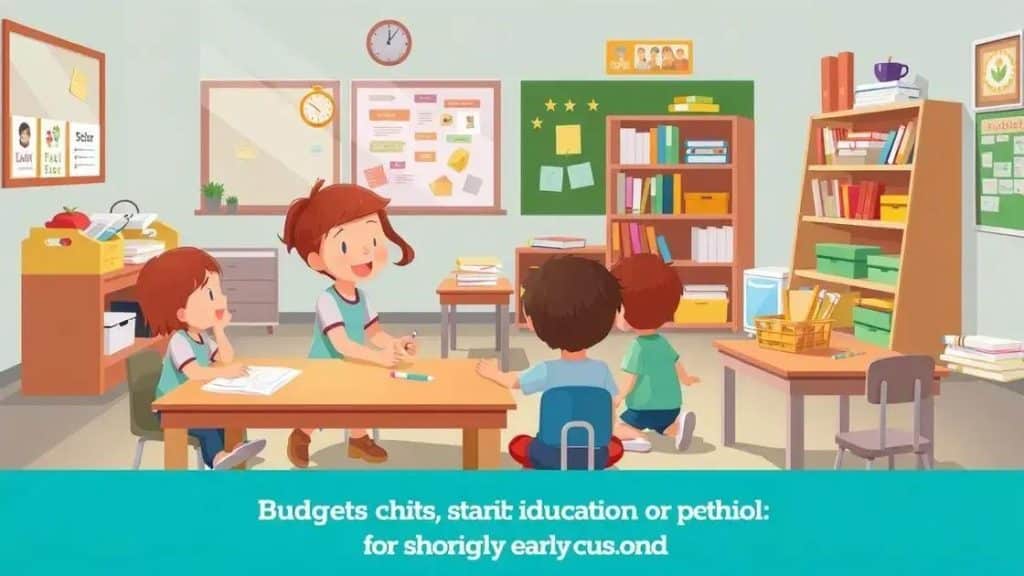Early education programs face drastic budget cuts

Anúncios
Early education programs face drastic budget cuts, which severely impact children’s development and access to quality education, prompting communities to seek innovative solutions and advocate for increased funding.
Early education programs face drastic budget cuts, and this could change the landscape of childhood development. Have you thought about how these cuts might affect our future generation? Let’s dive into the implications and explore potential solutions.
Anúncios
The current state of early education funding
The current state of early education funding is crucial to understanding the challenges ahead. Funding for early education has seen fluctuations over the years. Many programs rely on government support, which can vary significantly. These budget cuts are not just numbers on a page; they impact children’s future.
As we examine the funding landscape, it becomes evident that many schools struggle to provide quality education. This is a concern for both children and educators. A lack of resources can lead to crowded classrooms and insufficient materials.
Anúncios
Impact of Government Funding
When government funding decreases, the effects can be severe. Early education programs may have to:
- Reduce the number of teachers available.
- Limit the services provided to families.
- Cut vital programs like nutrition and enrichment activities.
Such cuts can disproportionately affect low-income families. Parents often rely heavily on these programs to ensure their children receive the best start possible.
Local Funding Sources
In addition to federal funding, local sources also play a significant role. Community support can help fill the gaps created by cuts. Unfortunately, not all communities have the resources to do this. Some programs have started implementing:
- Fundraisers to support operations.
- Partnerships with local businesses.
- Grant applications to secure additional funds.
Nonetheless, this varies widely, and many programs remain at risk.
Parents and advocates are increasingly recognizing the importance of early education funding. Awareness campaigns aim to highlight the risks these budget cuts pose. Inviting the community to take an active role can make a difference. By coming together, they can strive for more equitable funding for all early education programs.
Consequences of budget cuts on childhood development

The consequences of budget cuts on childhood development are significant and concerning. When funding decreases, many programs struggle to maintain the quality of education that children need. These cuts can lead to larger class sizes and fewer resources, which directly impacts the learning experience.
Children benefit immensely from early education, particularly in their formative years. They learn vital social skills and cognitive abilities during this critical period. Without sufficient funding, these opportunities may diminish, leaving lasting effects on children’s readiness for school.
Impact on Learning Outcomes
Reduced funding affects various aspects of a child’s education. It can result in:
- Limited access to quality teachers and educational materials.
- Fewer programs that address diverse learning needs.
- Decreased extracurricular activities that promote social skills.
Each of these factors can hinder a child’s ability to thrive academically and socially. Children need both a strong foundation in academic skills and a rich social environment to succeed.
Long-Term Effects on Families
The impact of budget cuts doesn’t stop with children; it extends to families as well. Parents may find it harder to locate affordable early education options. This situation forces families to make difficult choices. They might have to:
- Seek alternative care options that may be more expensive.
- Consider leaving the workforce to care for their children.
- Rely on less effective educational alternatives.
Such challenges can create a cycle of disadvantage, particularly for low-income families. As parents struggle, children’s development may be compromised.
In summary, the consequences of budget cuts on childhood development are far-reaching. It is essential to recognize and address these issues to ensure every child has access to quality education and support during their formative years.
Community responses to funding shortfalls
Community responses to funding shortfalls in early education programs are crucial for sustaining support. When government budgets are slashed, local communities often step up to fill the gap. This grassroots involvement can take many forms, showcasing the power of collective effort.
Nonprofit organizations play a key role here. Many local groups are dedicated to advocating for children and securing additional resources. They often organize events to raise awareness and funds. These initiatives can include:
- Community fundraisers to support local early education programs.
- Awareness campaigns that highlight the importance of funding.
- Creating partnerships with local businesses for sponsorships.
Such actions rally the community to support early education. They also foster a sense of belonging and shared responsibility among residents.
The Role of Parents and Families
Parents and families are often the first line of defense against funding cuts. Many join together to advocate for their children’s education. By forming groups, they can actively seek solutions. For instance, they might:
- Organize meetings with local officials to discuss funding issues.
- Engage in local school board meetings to voice concerns.
- Lead petitions to promote increased funding for early education.
This collective approach strengthens community ties while ensuring that children’s needs do not fall by the wayside.
Success Stories
Some communities have reported success in overcoming funding difficulties. For example, by collaborating, they were able to bring in new resources and support. These successes often serve as models for others facing similar challenges. As communities unite, they strengthen their voice in advocating for early education funding and inspire others to take action.
Efforts such as community networking events can make a big difference across different programs. Sharing tips and strategies can lead to innovative solutions that benefit everyone. When communities come together, the impact can be powerful, even in the face of budget cuts.
Possible solutions to sustain early education

Possible solutions to sustain early education are essential as programs face budget cuts. Communities and policymakers can work together to develop strategies that ensure children receive the education they deserve. Finding ways to secure funding and resources is crucial in this effort.
One effective method is to foster strong partnerships between schools and local businesses. When businesses invest in their local education systems, they help create a supportive environment for children. This relationship can take several forms, such as:
- Financial contributions to support programs and activities.
- Providing volunteers who can assist teachers and students.
- Donating materials or resources to enhance learning experiences.
Such collaborations benefit not only the schools but also the businesses, as they create a better-prepared workforce.
Advocacy for Increased Funding
Advocacy is crucial to securing additional funding for early education. Teachers, parents, and community members can take action by engaging with local lawmakers. They can:
- Attend town hall meetings to voice their concerns.
- Mobilize others to join campaigns that support education funding.
- Utilize social media platforms to raise awareness about the importance of early education.
By amplifying their voices, communities can make a strong case for prioritizing early education in the budget decisions.
Innovative Program Models
Another solution is to explore innovative program models. Schools may consider alternative approaches to traditional education, such as:
- Combining resources with neighboring districts to share costs.
- Utilizing digital learning tools that can provide flexible options for students.
- Implementing sliding scale fees for families to ensure programs remain accessible to all.
These creative solutions can help programs adapt to funding challenges while still meeting the needs of children.
Ultimately, the goal is to create a sustainable early education system that provides every child with the opportunity to thrive. By harnessing community resources, advocating effectively, and embracing innovative approaches, lasting change can happen.
FAQ – Frequently Asked Questions about Early Education Funding
How do budget cuts affect early education programs?
Budget cuts can lead to larger class sizes, fewer resources, and decreased access to quality teachers, impacting children’s learning outcomes.
What can communities do to support early education during funding shortages?
Communities can organize fundraisers, advocate for increased funding, and form partnerships with local businesses to provide additional resources.
Why is parental involvement important in early education?
Parental involvement helps strengthen community ties, supports children’s educational experiences, and advocates for better funding and quality programs.
What innovative solutions can schools explore to sustain early education?
Schools can consider shared resources with neighboring districts, digital learning tools, and sliding scale fees to increase accessibility and reduce costs.





